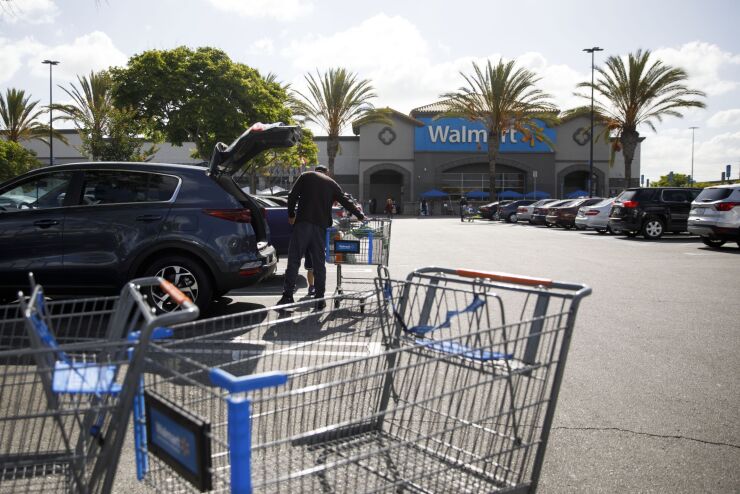MoneyGram is digging in its heels in anticipation of competition with Western Union at Walmart locations.
Both money transfer companies grew their online and mobile operations during the pandemic, when fewer people were going to stores. Now that economies are reopening, Western Union is launching its services
"I'm extremely pleased with where we are at as a company, but we have one big challenge here with Walmart," MoneyGram CEO Alex Holmes said Friday during the company's first-quarter earnings call. "But it is not something we aren't used to, and it is something we are prepared to address. Outside of that, we look forward to a good year holistically."
Western Union has a retail spot reserved in about a third of the 4,700 Walmart stores it plans to be in the coming months, and MoneyGram is expecting the effect on its own revenue to become clearer during the second quarter, when WU accelerates that rollout.

"We have pivoted a little bit, doing a few different things with our branded products and have matched a couple of prices this year and made some changes to cover that," Holmes said of MoneyGram's initial response. "So far we have seen very little impact, if any at all, on the business and we continue to perform extremely well and are well positioned going forward."
Part of MoneyGram's confidence stems from having a more diversified portfolio for money-transfer revenue, with the growing digital segment as well as expected partnerships with cryptocurrency providers.
But the Dallas-based company must rebuild its cash balance, as it has a potential revenue impact of $10 million in future guidance based on the competition at Walmart, said Larry Angelilli, executive vice president and chief financial officer at MoneyGram.
"There are uncertainties surrounding the potential impact on our pricing and volumes, especially since this (Western Union) rollout is in the early stages," Angelilli noted.
MoneyGram is especially attentive to Western Union's pricing choices.
"The brand of products that they put in either matches what our prices were or undercuts us on some of the upper brands," Holmes said. "There seems to be some promotional rates going on now as well."
The uncertainty about Walmart is balanced by a record quarter for MoneyGram Online volume. Year-over-year, MGO delivered 119% revenue growth and 102% transaction growth, both fueling new app downloads and customer retention rates.
Year-over-year, cross-border online revenue grew 131% and transactions grew 130%. Total digital transaction growth, including MGO and digital partnerships, grew 86% in the first quarter.
Digital revenue set a record of $60.4 million in the quarter, a 77% increase year-over-year, as digital transactions accounted for 32% of all money transfers at the end of the quarter, nearly doubling the amount after the first quarter of 2020. Walk-in revenue remained steady, with growth coming from cross-border transaction volume in the U.S. and Europe. Money transfer revenue was $285 million, a 12% increase year-over-year.
It helped MoneyGram report overall first-quarter revenue of $310 million, a 7% increase over the first quarter of 2020. Operating income was $8.4 million, a 4.7% decrease from $13.1 million in 2020. The net loss for the quarter was $15.4 million, a 6% improvement over the $21.5 million in 2020.
MoneyGram noted the elimination of the $12.1 million net benefit from Ripple market development fees generated in the first quarter of 2020 because of the halting of transactions under the commercial agreement with Ripple that became effective in early December of 2020.
MoneyGram stepped back from its
Shortly after MoneyGram announced its pause in Ripple activity, Ripple released a statement saying the two
At the time, Ripple said it was remaining as an investor in MoneyGram.
MoneyGram also reported that its payments to the government in its Deferred Prosecution Agreement have come to an end, and it expects the government to move to dismiss the matter by Monday, May 10.
MoneyGram had agreed to forfeit $125 million because of the Department of Justice citing weaknesses in the company's anti-fraud and anti-money laundering programs, resulting in a breach of its 2012 deferred prosecution agreement. In addition to those payments, MoneyGram also had to enhance its anti-fraud programs.
"Unless you have sort of lived through it, it is hard to get perspective on it, but one thing I could say about having the DPA (issue) is it certainly forces you to think differently and, in our case, reinvent ourselves," Holmes explained.
The money forfeiture and improved programs have moved MoneyGram into a stronger position for the digital era, Holmes added.
"We talk a lot about switching from an old model to a consumer-first, data-driven decision-based organization," Holmes said. "As painful as it was to get there, we now know everything we could possibly know about our customers" through stronger data security and know-your-customer technology.
In that regard, MoneyGram will continue to invest in its conversion to a cloud-based infrastructure, advanced digital technologies and upgrades to the point-of-sale systems at retail locations.





